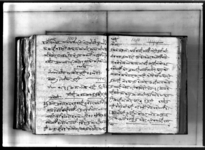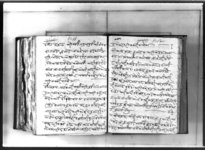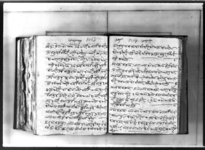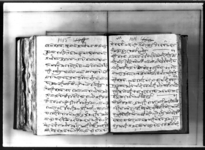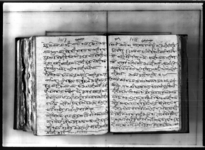A copy of a set of directives re hulāka stations for areas between Dharmasthalī in Kathmandu and the Yamuna River in Kumaun (VS 1866)
ID: RRC_0006_1015
Edited and
translated by Manik Bajracharya
in collaboration with
Pabitra Bajracharya
Created: 2019-06-19;
Last modified: 2020-04-30
For the metadata of the document, click here
The accompanying edition, translation/synopsis and/or commentary are available under the terms of the Creative Commons Attribution-ShareAlike 4.0 International License
Abstract
This document, addressed to the subedāras Balabhadra Khatrī and Dharmānanda Khavāsa, is a set of directives regarding the hulāka posts for areas between Dharmathalī in Kathmandu and the Jamuna River in Kumaun. For another copy of this document, see RRC_0040_0044.Diplomatic edition
[1009]
1३६७1मीतीप्रथमआषाड्सुदी४रोज[...]2प्रसोस्ती¯¯¯¯¯¯ ¯¯¯¯¯¯ ¯¯¯¯¯¯
3आगेसुवेदारवलभद्र्षत्रीसुवेदारधर्मानंदष
4व़ासकेधर्मथलीपस्चींजमुनापुर्वजगाजगामा
5जाईगर्न्याकाजकोसव़ालगरीवक्स्यौंसव़ाल
6वमोजींकोकाजगर्दाकसैकोमुलाहीजानप
7रीहाम्रानीमककोसोगरीलाय़ाकोकांमातत्पर
[1010]
१९३4448भैगर¯¯¯¯¯¯ ¯¯¯ ¯¯¯ ¯¯¯¯¯¯
9प्रथमसव़ाल :धर्मथलीपस्चींभेरीपुर्वची
10ठीपत्रकाहुलाकराष्य़ाकोमोहरवमोजींवसे
11नवसेकोषसोषासजाचीअघीकोमोहर
12वमोजींकोहुलाकीलाईसाउंनेफागुको
13आधावेथवेगारघरवारी∙कोसेर्मामाफ्गरी
14हुलाकीलेकमाय़ाकोषेत्अधीञानषोस्
15नुभनीमोहरगरीवक्सेकोहो६६सालदे
16षीसाउंन्य़ाफागुआधातीर्न्यास्मेत्माफग
17रीअधीञाषेत्घर१केमुरी कमाउंनु
18गरीवंधेजवाँधीवक्स्य़ौंये़सवमोजींको
19रुक्कालेषीअघीलोमोहरस्मेत्हाम्राह
20जुरचर्हाईपठाउंनुमोहरगरीवक्सीपठा
21उंला¯¯¯¯¯¯ ¯¯¯¯¯¯१
[1011]
44522दोश्रासव़ाल :भेरीपस्चींजमुनापुर्वचीठीपत्र
23कागजकोहुलाकचलाउंन्य़ाहरूलाईअ
24घीकामोहरमालेष्य़ाकोरकंरजगाअनुसार
25ये़ससालकावंदेजवमोजींचाहीन्यारकंको
26व़ाजषाममीलाईरुक्कालेषीअघीलोमोहर
27स्मेत्हाम्राहजुर्मारचढाईपठाउनुमोहर
28गरीवक्सीपठाउंला¯¯¯ ¯¯¯¯¯¯¯¯¯ [...]
29तेस्रोसव़ाल :धर्मथलीपस्चींभेरीपुर्वजगाजगामा
30मुलरास्ताकाचलदोमील्दोगरीभारीकाहुलाक
31वोक्नालाईदीं१कोवाटमा४जगामाहुलाक
32राषनु१जगाकाहुलाकमाघर२०वीसराषी
33जगाजगामाराषेकोभारीवोक्नेहुलाकीको
34साउंनेफागुउंघाउंनीपघाउंनीझारावेठवेगार
35माफगरीवक्सेकोछताहाव़ाजषांमीलाई
36वंदोवस्तगरीरुक्कालेषीहाम्राहजुरचढाईपठाउ
[1012]
१९५44637नुमोहरगरीवक्सीपठाउंला¯¯¯¯¯¯३
38चौथासव़ाल :हुलाककाभारीवोक्दाञाहा
39वाटजान्य़ापस्चींवाटआउंन्य़ान्य़ाजंगीकांको
40रवीरामीवाहीकवीनालालमोहररकाजी
41भींसींथापाकोदसषत्हुलाकचलाई∙देउ
42भंन्य़ानदेषीगुरुप्रोहितचौतरीय़ाकाजीसर्दार
43सुक्काव्वासुवेदारजमादारसीपाहीचारवर्णछ
44तीसैजात्कसैकोभारीनवोकनुय़ोभारीदर्वार
45कोहोभनीढाटीकसैलेहुलाकचलाय़ोभनेआ
46लमालमानीसस्मेतपक्रीहाम्राहजुरवींतीगरी
47पठाउनुहुकुमगर्यावमोजींगर्नुभनीऊर्दीसवैला
48ईसुनाईदीनु¯¯¯ ¯¯¯¯¯¯¯¯¯¯¯¯४३
49पाचौसव़ाल :चीठीपत्रकाकागत्य़ाहुलाकीरभा
50रीवोक्न्य़ाहुलाकीलाई∙वंद्येजवाधीवक्सेको
51मोहरवमोजींमाकसैलेवीथीतीगरीजवरजस्ती
[1013]
44752अंन्य़ाये़गर्य़ोभनेतेसमानीसलाईपक्रीहा
53म्राहजुर्मावींतीगरीपठाउंनुभनीअडाअडा
54काभारासुवासुवेदारगैरकानाउंमामोहर
55गरीवक्सेकोछतसअर्थमर्स्यागदीपस्चीं
56कालीपुर्वतालुकपोषराकालीपस्चीं∙सषी
57पुर्वतालुकप्यु़ठानासषीपस्चींभेरीपुर्वता
58लुकसल्यांभेरीपस्चींकर्नालीपुर्वतालुकआ
59छामदोटीकाकाढागाउंपस्चींमाहाकालीपु
60र्वतालुकडोटीदीपाये़लमाहाकालीपस्चीं
61गढकासीमनापुर्वतालुकअलमोडाकुमाउं
62कोसाँधपस्चींभागीर्थीपुर्वतालुकश्रीनगर
63भागीर्थीपस्चींजमुनापुर्वतालुकदुनजगा
64जगामासोईवमोजींसुनाईदीनु¯¯¯ ¯¯¯¯¯¯५
65छठमासव़ाल :जगाजगाकागढीकीलावंन्य़ा
66नवंन्य़ाहेर्नुकुरन्य़ामानीसवसेनवसेको
[1014]
१९७44867जाचनुनवन्य़ाकावीगरेकोभय़ावनाउना
68कोताकीतीगर्नुसोकैफीये़तहाम्राहजुरवींती
69गरीपठाउनु¯¯¯ ¯¯¯¯¯¯ ¯¯¯¯¯¯६
70सातव़ासव़ाल :जगाजगाकोतारघाटहेर्नुवीग
71र्य़ाकोरनवन्य़ाकोठाउंमाउसजगाकोभारादार
72अमालीदारलाई∙षैगरिवनाउंनलाउंनुवनाय़ा
73कोरनवनाय़ाकोवीस्तारवींतीगरीपठाउनु¯¯¯¯¯¯७
74आठमासव़ाल :जगाजगामावस्न्य़ाभारादारसु
75वासुवेदारगैरकासाथमाछोटावडामानीसक
76तीरह्य़ाछं∙क्यातद्वीररहेछ∙षसोषासले
77षीचडाईपठाउंनु¯¯¯¯¯¯¯¯¯८
78नौमासव़ाल :जगाजगाकोवारदषानामेगजींमाका
79रषानापुरोचल्य़ाकोरनचल्य़ाकोहेर्नुगर्य़ाको
80काजतय़ारभय़ाकोवंदुकवारूदकाजगर्न्यामानीस∙
81कालीगढस्मेतजनाजातफर्दहाम्राहजुरचढाईप
82ठाउंनु¯¯¯¯¯¯ ¯¯¯¯¯¯९
[1015]
44983दसमासव़ाल :प्यु़ठानाकुमाउंवाटषजानामु
84हुडामाकतीगये़छञाहावाटप्यु़ठानावाट-
85कुमाउंवाटमुहुडामागय़ाकोषजानाकाहा
86क्य़ाअर्थलेअटकदोरहेछजस्ताकोतस्तोवींती
87गरीपठाउंनुषजानाञाहाअटक्य़ाकोछवा
88हाकाभारादारसुवासुवेदारसेगुताजगाजगा
89काअमालीलाईषैगरीचाडोहीडाउंनु¯¯¯¯¯१०
90ये़घारौसव़ाल :वाटकाजगाजगाकागाउंमाआउं
91न्य़ाजान्य़ाकोवीद्दतलेउठ्य़ाकागाउंकुरीय़ाला
92ईतसलहगरीझीकाईवसाउंनुजगाजगामारह्या
93काभारादारकंपनीअमालीलाई∙रास्ताकागांउ
94मादर्वारकोकाजलेहाम्राहुकुंवाहीकआउने
95जान्य़ामानीसलेहरुलेआफ्नाभारीवेगारी
96वैकरकोटंटालाउंननदीनुभनीउर्दीसुनाईदीनु
97औ∙ये़ससव़ालवमोजींगर्य़ाकाकाजको
[1016]
१९९45098ये़कफर्द∙साफगरीतैलेराषनुये़कफर्दसाफग
99रीहाम्राहजुरचढाईपठाउंनु¯¯¯¯¯¯¯¯¯११
100वारौसव़ाल :जगाजगाकोकंपनीकोहाजीरलीनुहा
101जीरलीदारैवंदीवमोजींनालज्ञाजीमाजुंकंपनीमा
102जतीभर्नाभय़ाकोछैनषेत१कारुपैया२५कोदर
103लेभारासुवेदारजस्कातैनाथीछउसैसंगभरीलीनु¯¯¯¯
104१२
105तेरौसव़ाल :ञाहादर्वारवाटजान्य़ाचीठीपत्रर
106मुहुडावाटआउनेचीठीपत्रजंगीकांकोषर्षजनातो
107पवंदुकगोलीपथरवारुदजस्काअमलमाअट्
108कंछअट्काउंनेलाइदंडगर्नु¯¯¯ ¯¯¯¯¯¯¯¯¯१३
109चौधौसव़ाल :हुलाकीकाघरलाईअधीञाषे
110तदीदासमेत्राषीये़कषेत्दीदेषीउंधोरचाली
111समुरीदेषीउंभोजाहांहेरीगरीदीनुऔ∙ये़कदीन
112कोवाटामाघारजगामाभारीवोकनेहुलाकरा
113षनुभनीसव़ालमाचर्ह्य़ाकोछतसर्थतीमी
[1017]
451114हरूलेजगाजाचीलामोवासरछोटोवास
115जगाअनुसारये़कदींकावाटामाभारीकाचा
116रहुलाकदेषीउंधोधोदुइहुलाकदेषीउंभो[...]
117जषाममीलाईहुलाकराषीरुक्कालेषीचढा
118ईपठाउंनुमोहरगरीवक्सीपठाउंला¯¯¯¯¯¯१४
119पंध्रौसव़ाल :कागत्य़ाहुलाकीरभारीहुलाकी
120लाईमाफगरीवक्स्य़ाकारकंकलंअघीवसाय़ा
121काहुलाकीकोजगाजगाकाअमालीलाईकेही
122मीन्हावक्स्य़ाकोछैनकैछअववस्न्य़ाहुलाकी
123कोजगाजगामाजतीजतीजसजसकाषांगीमा
124काटींछसोरुपैञाकोफर्दस्मेत्हाम्राहजुरच
125र्हाईपठाउंनु∙ठगांगरीवक्सौला¯¯¯¯¯¯¯¯¯१[...]
126सोरौसव़ाल :कागत्य़ाहुलाककोवंदोवस्तगर्दाये़क
127 घरकोसेर्मारुपैञाये़कसम्ममाफ∙गरी∙रुक्काले
128षीचढाईपठाउंनुमोहोरगरीवक्सीपठाउंला
129 मीतीसदर⟪आषाढसुदी४१८६६⟫¯¯¯¯¯¯ ¯¯¯¯¯¯
Translation
[1009]
3671
Date: Saturday, the 4th of the bright fortnight of the first Āṣāḍha.2
Āge: To the subedāras Balabhadra Khatrī and Dharmānanda Khavāsa.
We have issued [this set of] directives concerning tasks to be carried out at different locations west of Dharmathalī and east of the Jamunā [River]. When carrying out the tasks mentioned in the directives, be true to our salt and perform the assigned duties promptly without showing favouritism to anyone.
[1010]
First directive: We [previously] issued a royal order (mohara), stating: "In accordance with [earlier] moharas concerning the establishment of hulāka-posts for the transport of mail [within the area] west of Dharmathalī and east of the Bherī [River], inspect thoroughly whether [the hulāka-posts] are present or not. Exempt hulākī porters specified in earlier moharas from half of the sāune-phāgu [levy], beṭha and begāra [labour obligations], and from the sermā [levy] on homesteads. Do not confiscate paddy fields or any fields being cultivated by hulākīs under the adhiyā [system of tenancy]." We have made arrangements so that from the year [VS 18]66 (1809 CE), they are exempt from [the remaining] half of the sāune-phāgu [levy], and so that each household may earn ...4 murīs from paddy fields [cultivated under] the adhiyā [system]. Draft a rukkā in accordance with this and dispatch it to us together with the earlier mohara. We will send [it back to you] after affixing the royal seal (mohara) --- 1.
[1011]
Second directive: Conforming to the [allocated] sums (rakama) and land mentioned in earlier moharas for those who operate the mail-transporting hulāka-posts west of Dharmathalī and east of the Bherī [River], and in accordance with this year's arrangements (bandeja), prepare an estimate (vājakhāma) of required sums. Draft a rukkā accordingly and send it to us together with the earlier moharas. We will send [it back to you] after affixing the royal seal --- 2.
Third directive: Put in shape the main routes at the different places west of Dharmathalī and east of the Bherī [River], and in order to transport loads [of goods] set up 4 hulāka-posts along the route over a distance of each day's journey. Assign 20 families to each hulāka-post. [The king] has exempted the load-transporting hulākīs employed at different places from the following [obligations and levies]: sāune-phāgu, ughāunī-paghāunī, jhārā, beṭha and begāra. Prepare an estimate and put things in order. Draft a rukkā and send it to us.
[1012]
We will send it [back to you] after affixing the royal seal --- 3.
Fourth directive: Regarding the carrying of loads, excluding loads going from or coming from the west relating to military activity or to sick persons, do not, without seeing a lālamohara or a document signed by Kājī Bhīṃsīṃ Thāpā with an order to transport loads, carry anyone else's loads including those of [guru-]priests, cautarīyās, kājīs, sardāras, subbās, subedāras, jmādāras, sipāhīs, or [members] of the four caste-classes (varṇa) and thirty-six castes (jāta). If someone has loads transported, falsely stating that the loads belong to the palace, detain the man along with his luggage and report [the matter] to us. Instruct everyone to act as ordered --- 4.
Fifth directive: [The king] has issued a [lāla]mohara to the bhārā[dāra]s, subbās, subedāras and so on of various offices, proclaiming: "If anyone in disregard of the arrangements made [by us] regarding the mail-transporting kāgatyā-hulākīs or the load-transporting hulākīs coerces or causes injustice to them, detain that man and report [the matter] to us."
[1013]
For that reason relay this information to the [following] places, [responsible for
the following regions]:
Pokhara: [for the region] west of
the Marsyāṅdī and east of the Kālī
Pyuthana: [for the region] west of the Kālī and east of
the Sakhi
Salyan: [for the region] west of the Sakhi and east of
the Bherī
Dullu [of] Dailekh: [for
the region] west of the Bherī and east of the Karṇālī
Achham: [for the region] west of the Karṇālī and east of
Kāḍhā Gāũ (Doti)
Dipayal [of]
Doti: [for the region] west of Kāḍhā Gāũ (Doti) and east
of the Mahākālī5
Almora: [for the region] west of the Mahākālī and east of
the border with Garh
Srinagar: [for the region] west of the border with
Kumaun and east of the Bhāgīrathī
Dun: [for the region] west of the Bhāgīrathī and east of
the Jamunā --- 5.
Sixth directive: Check whether or not forts and fortresses have been built at various places. Find out whether they are properly manned.
[1014]
If they have not been built or are in disrepair, apply pressure to have them built or repaired. Send a report about this to us --- 6.Seventh directive: Inspect the river crossings (tāraghāṭa). At places where they are broken down or need to be repaired, admonish the local bhārādāras or amālīdāras to have them repaired. Send [us] details of whether they have been repaired or not --- 7.
Eighth directive: Send an exact report regarding the number of bhārādāras, subbās, subedāras etc. from place to place along with [the number of] men of high and low rank, and the kinds of arrangements (tadbir) they have [among themselves] --- 8.
Ninth directive: Check from place to place whether or not factories at powder houses and magazines are functioning at full capacity. Send to us a report of the work done—the guns and gunpowder produced—and information on the number of workers and artisans and their castes --- 9.
[1015]
Tenth directive: Submit reports to us regarding the amount of munitions (khajānā) sent to the front (muhuḍā) from Pyuthana and Kumaun, and where and for what reasons munitions sent to the front from here (i.e., Kathmandu), Pyuthana and Kumaun get obstructed. Wherever munitions are obstructed, admonish the local bhārādāras, subbās, subedārās, segutā6 and amālīs to have them moved on quickly --- 10.
Eleventh directive: At villages at places along the [hulāka] route which are deserted due to oppression caused by passersby, solace tenants from the villages and have them [re]settled there. Have bhārādāras, [military] companies and amālīs of the various places informed of our order: "Except for those travelling on palace business or by our orders, people travelling through villages on the route shall not be allowed to cause trouble [to villagers] by having them carry loads for free (begārī), or by demanding free provisions (baikara)." Get a report of action taken according to this regulation,
[1016]
keep one copy for yourself, and send another copy to us --- 11.Twelfth directive: Take attendance at [military] companies at different places. When doing so, collect from the bhārādāra or subedāra on duty whatever [revenue] has not been paid up in companies …7 in accordance with raibandī [system], at the rate of 25 rupees per kheta --- 12.
Thirteenth directive: If mail and military supplies [including] cannons, guns, bullets, flint and gunpowder dispatched from the palace or coming from the front are obstructed, the person exercising jurisdiction over the place shall punish the obstructer --- 13.
Fourteenth directive: When providing paddy fields to hulākī households on an adhiyā [tenure basis], distribute them in the presence of the [local] amālī: [to each household] land between forty muris and one kheta (i.e., 100 murīs) according to the size of the family. It is stated in the [above] directive that for a distance of one day's journey there should be four hulāka-posts for transportation of loads.
[1017]
Therefore, after checking the remoteness of the terrain, and estimating according to whether long or short rest stops [are necessary,] establish between two and four hulāka-posts for a one day's journey. Prepare a rukkā accordingly and send it to us. We will send [it back to you] after affixing the royal seal --- 14.
Fifteenth directive: Regarding the official amount under exemptions granted to the mail- and load-transporting hulākīs, some of it has already been compensated to the amālīs of the corresponding areas. Regarding newly appointed hulākīs at different places and the amounts deducted [for them] from [the amālīs's] emoluments (khāngī), send us details of the amounts. We will make arrangements [accordingly] --- 15.
Sixteenth directive: When making arrangements for mail-transporting hulāka-posts, prepare [a draft of] a rukkā granting a maximum exemption of one rupee per household from the sermā [levy]. We will send [it back to you] after affixing the royal seal --- 16.
The date is valid. The 4th of the bright fortnight of Āṣāḍha in [the Vikrama era year] 1866 (1809 CE).
Commentary
This copy of an order issued by King Gīrvāṇayuddha to subedāras Balabhadra Khatrī and Dharmānanda Khavāsa consists of sixteen directives concerning the management of the hulāka for relaying mail and loads in the western part of Nepal.
The first directive completely exempts mail-transporting hulākīs from the sāune-phāgu levy. It mentions earlier royal orders regarding the establishment of hulāka-posts along the route.8 . In this and several of the following directives, the addressees are asked to compose drafts of rukkās, which then would be officialized at the palace by affixing the royal seal.
The third directive concerns load-transporting hulākīs. It instructs that four hulāka-posts be set up within the distance covered by a day’s journey, and that twenty hulākī families should be assigned to each post. These hulākīs are exempted from the same levies as cancelled for the mail-transporting hulākīs, with the exception of ughāunī-paghāunī replacing sermā.
The fourth directive limits the categories of loads allowed to be transported to ones relating to: military activity, sick persons and a written order from either the king or Kājī Bhīmasena Thāpā
The fifth directive names nine regional offices as responsible for the organization of the hulāka system. Directives six and seven order the maintenance of forts and river crossings, while directive eight orders that records of army men at the different camps be kept. Directives nine and ten call for inspecting ammunition factories, and keeping records of transfers of munitions between the areas.
The eleventh directive is concerned with preventing the misuse of hulākī labour. Labour exploitation of the tenants appointed to hulāka tasks was common, so that the palace had to issue a plethora of orders at different times to prevent it. The exploitation in some places was so harsh that some villages along routes had become desolate. This section instructs the addressees to encourage tenants to resettle such villages, and prohibits people from using hulākī labour to transport any private loads.
The fourteenth directive states that the transfer of land to hulākīs for their service should be done in the presence of the local amālīdāra. This section refines the third directive by stating that between two and four hulāka-posts be set up to cover a day’s journey, depending on the terrain.
The fifteenth directive documents that the government occasionally provided compensation to local amālīdāras for amounts exempted from taxes and levies bourne by hulākīs.
The sixteenth directive exempts the hulākīs from one rupee of sermā levy. This, however, seems to contradict with the first directive where the sermā is entirely exempted.
An English translation of this document was first published in Regmi 1986: 138-141, and extracts are available in Stiller 1976: 52-54 and K. L. Pradhan 2012 : 222-224.
In the wake of war with the British, such hulāka routes were organized for eastern part of Nepal and other places as well (see RRC vol. 41, no 533, p. 514, RRC vol. 41, no. 538, p. 517 and RRC vol. 41, no. 569, pp 556-561).

